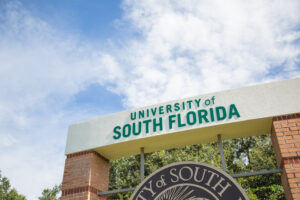UFF disagrees with USF’s approach to variant concerns

The United Faculty of Florida (UFF) USF chapter acknowledged Interim President Rhea Law’s denial of their request to keep classes online in its biweekly email update, while detailing what the next step is concerning student safety.
The email assured students and faculty of ways to continue combatting the pandemic, even if USF remains completely open.
“Most of us and most of our students are back in class despite UFF’s appeal to USF President Law to at least put the first few weeks online as a precaution,” the update said. “So what precautions should we take? Predictably, the Centers for Disease Control and Prevention recommends vaccines, masks and testing.”
Arthur Shapiro, president of the USF chapter of UFF, wrote an open letter Jan. 5 addressed to Law in which he requested the university hold the first three weeks of classes online. He cited that the current COVID-19 wave, caused by the omicron variant, is projected to peak very soon, therefore making a return to in-person classes in the near future likely.
As noted in the update, sent out Jan. 10, Law didn’t accept the request and continued with plans to keep the campus fully in person.
While the importance of vaccines was emphasized in the email, it was mentioned how even those who are vaccinated need to remain cautious, especially with the omicron variant.
“These vaccines appear to be less effective in preventing omicron infection but are still reasonably effective in preventing serious illness resulting from omicron,” the update said.
“One consequence is that vaccinated people can infect others even if they are asymptomatic — something that caregivers and family members of vulnerable people should think about.”
Vaccinated or not, to prevent the spread of the virus, mask-wearing was suggested by the chapter as something that could be easily promoted on campus, even if they aren’t required in class.
“Masks seem to provide less protection for the wearer, but they protect the people around the wearer,” the update said. “This could be a point to stress in class: while faculty are not supposed to require students to wear masks, they can say that students wearing masks are showing consideration for other people in the class.”







